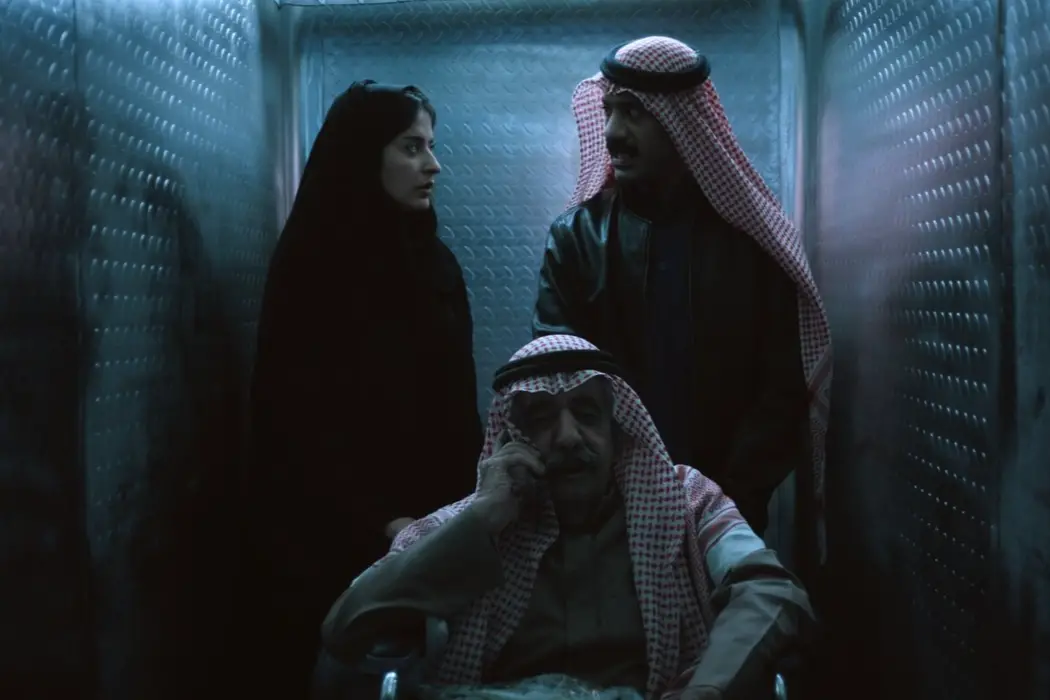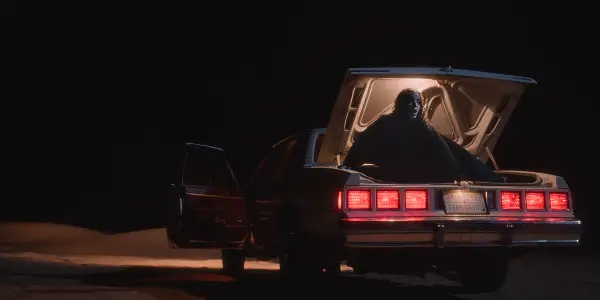Toronto Film Festival 2023: MANDOOB & NAGA

I'm a film journalist and independent filmmaker who fell in…
In some shape or form, both protagonists from the following Saudi Arabian films are limited in terms of societal expectations, and by how they’re perceived and regarded by those around them. From the manic to the madcap, and the heartbreaking to the heart-racing, these gems – both of which differ in sensibility – are both a mirror and a window to our very hearts and souls.
Mandoob [Ali Kalthami]
In a sea of faces swimming within the confines of an indifferent hierarchy, Fahad’s (Mohammed Aldokhi) stands out from the herd. Desperation sweats from his pores. He feels angry and betrayed, and his options are sparse. Beyond security and stability, he feels entitled to a great deal of respect…even if he doesn’t always earn it.
At one point or another, we’ve all tasted the sadness that Fahad feels, but seldom do we bathe in it.
By day, he works as a call centre operator, where he’s berated by his superiors for breaking protocol and revolting against employee etiquette (something he denies). When he’s not being an HR nightmare, he is a delivery courier (the titular Mandoob); driving from place to place, trying to balance his familial roles as chauffeur for his struggling sister (a single mother), and as a carer trying to secure funds for his ailing, diabetic father.
Upon discovering a secret facility containing a stash of alcoholic beverages (explicitly illegal in Saudi Arabia), Fahad becomes a bootlegger, catering to a specific clientele who reside in the more affluent parts of Riyadh, without anticipating the dire consequences of unchartered territory.
The genius of Kalthami‘s script (which he co-wrote with Mohammed Algarawi) is how it perfectly complements Aldokhi‘s nuanced performance. Aldokhi plays Fahad with a straight face (foul mood or otherwise) but laces his portrayal with irony and sarcasm, an asset stemming from his background in comedy. His (refreshing) sense of confidence when he bullshits his way through trouble helps offsets his deeply unhinged nature. His dim perspective drives him further into the black hole that is this noirish world.

However, it doesn’t stop there, as Fahad’s missions may transport him to fluorescent-lit clubs of those reveling in ecstasy and private house parties, all of which rebel against the norm of the strict, non-secular rules of Saudi Arabia.
Despite certain classic elements, Mandoob never fetishizes film noir or classic antiheroes.
Fahad shares DNA with Martin Scorsese protagonists Rupert Pupkin and Travis Bickle (both played by Robert De Niro), and even Adam Sandler‘s Barry Egan from Paul Thomas Anderson‘s Punch-Drunk Love (2002). He has even more in common with Breaking Bad‘s Walter White, who (amusingly) dislikes his product he peddles, but gets in over his head as he rolls with the punches.
It’s not the criminal power fantasy element that makes Fahad intriguing but it’s the neuroses that define him and his (potential) inspirations. Fahad is indeed a tragic case of “Big City” politics. Lonely, neglected and almost forgotten, to the point that he doesn’t feel like he can get any form of support.
However he seems all too comfortable playing along with the “victim complex.” There’s a clever touch of sound design early on in the film, where we as the audience aren’t quite sure whether what Fahad is hearing is actually happening around him or is all in his head. Either way, the results prove to be a primary catalyst that pushes him towards his drastic choices.
There’s even a clever combo of directing and editing, when Fahad examines his surroundings and studies the gestures of those in his vicinity. Are they with him or conspiring against him? The paranoia is too overwhelming.
The question is, what came first?
That is, does Fahad believe in his own narrative by way of deluding himself? Or has he been conditioned to think this way due to to the unforgiving nature of the metropolis he exists in?
Mandoob is an enticing and thrilling tale of Arabian noir, with a careful character study and an excellent lead performance front and centre. Kalthami demonstrates that not every criminal is inherently evil, but tragic circumstances may force them to be numb to the consequences.
NAGA [Meshal Al Jaser]
Congratulations to Meshal Al Jaser and his talented team for creating the greatest movie monster yet…the desert.
Yes, us Arabs have been typically associated with bearded men in rags roaming the dunes, night and day, on the backs of camels…when we’re not being portrayed as simple street merchants peddling food and all sorts of goods, like you’d see in Disney’s Aladdin (1992) or Stephen Sommer‘s The Mummy (1999).
Argue all you like, but for my money the representation of MENA culture & identity in North American media is still lacklustre (Ramy doesn’t count, sorry). We’re either saints, sinners or even simpletons (especially that). Rarely are we nuanced.
Which is why it’s absolutely refreshing to find great movies coming out of the MENA region, as is the case with Naga. If anything, it deconstructs the “Aladdin & Princess Jasmine” myth through a “harsh reality” fable where Jasmine is susceptible to ridicule and punishment.

Anyway, this is more or less forbidden by her family, especially since she is expected to be covered from head to foot outside the house.
Her tough-as-nails dad drops her off at a souk – ostensibly so she can go shopping with a friend – with the proviso that he picks her up at an allotted time that night. Obviously, she meets Saad who suggests they attend a gathering in the desert, so long as he drops her off at the meeting point in time without being found out.
Unfortunately, this complication is only the beginning of a rather tense, unnerving venture into anarchic wilderness as Sarah’s plan to return to her father is met with hindrances and obstacles…and the weirdest people you’ll ever encounter.
While many genre films incorporate cold openings that grab audiences by the throat, Naga‘s prologue sets out to traumatise the living shit out of you with what is both a condemnation of patriarchal sensibilities and a ghostly apparition that haunts the entirety of the film. It’s the idea and threat of male-led punishment that ensures that rules and traditions are followed to the letter.
It’s a monster that follows Sarah, and waits for her in the dead of night in that desert.
Part of the fun of Sarah is her rebellious nature. Bader infuses her character with lots of attitude and plenty of sass. Even more amusing is the childishness she exhibits when she tries to get her way in dire or madcap situations. What grounds her is her vulnerability, and Bader’s star-power allows her to shift seamlessly from apathetic heroine to a terrified victim in an instant.
She’s like a little girl lost in an acid-laced fairy tale, where she overcomes boundaries and weaknesses, monsters and demons, all while exposing her more sensitive traits.
Most importantly, is how her actions are utilised as a brilliant takedown of the patriarchy. Within the confines of civilisation, she is supposed to conform to a specific image. One that is repressed and leaves her shackled.
But way out in the barren wasteland, however, is the real deal. Raw, uncut footage that potentially illuminates the “criminal element” in the dark of night. It is there where Sarah is free to embrace another identity, one that doesn’t put up with misogynist crap nor with any hierarchal demands.
There are large doses of dark and wacky humour, especially a scene taking place within a tent that spans the infinite. A clever commentary on class and entitlement, aided by rather witty editing techniques (courtesy of Al Jaser and Laith Majali).
The manner in which Ibraheem AlShangeeti photographs the entire sandy arena gives it shades of beauty in the day, and a truly Stygian atmosphere whether the surroundings are pitch black, or at a clandestine party lit up with lanterns.
AlShangeeti also boasts a great deal of cine-literate leanings, with a Hitchc*ckian prologue that leaves one acrophobic and apprehensive about what’s lurking around the corner, and later echoes John Carpenter with a bloodthristy camel scanning its dark terrain for fresh meat.
Aided by vibrant music and exceptional technical prowess, Naga is hellbent on being an unstoppable force rather than a cohesive narrative. The film’s events feel elemental, and Sara, our strong heroine, is our vessel navigating the maelstrom. It’s enticing as it sounds, thrilling enough to induce palpitations and satirical to the point that makes it feel universal.
Does content like this matter to you?
Become a Member and support film journalism. Unlock access to all of Film Inquiry`s great articles. Join a community of like-minded readers who are passionate about cinema - get access to our private members Network, give back to independent filmmakers, and more.
I'm a film journalist and independent filmmaker who fell in love with cinema at a young age. I also love writing about comics, literature, podcasts, television and video games. I'm just as content watching a movie about a giant killer pig terrorising the Australian outback as I am with one that features a catholic priest in crisis.









